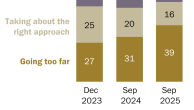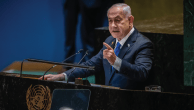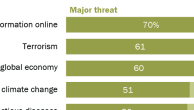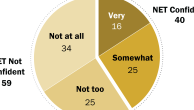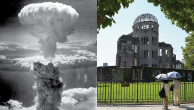Introduction
Over the past year, many of the dramatic reactions of the public to the events of Sept. 11 have slowly faded. The spike in trust in government is mostly gone, the public once again is highly critical the of the news media, and even President Bush’s approval ratings have come down from the stratosphere.(1) His job approval stands at 60% in the new poll, just nine points higher than pre-attack levels. Yet it is also clear that the attacks have left a lasting, perhaps indelible, imprint on life in America as well as on attitudes toward public policy.

In personal terms, all Americans are connected by recollections of the experience 97% can remember exactly where they were or what they were doing the moment they heard about the attacks. But the burden and continuing consequences of the attacks are not equally shared. Half feel that Sept. 11 changed their lives, but just 16% describe the changes as major. Understandably, the personal impact is much greater in those areas of the country that came under attack.
People living in the New York area report far more emotional consequences than do Americans living in other parts of the country, including residents of Washington D.C. Tellingly, 46% of respondents in a survey of the New York area said they knew someone who was injured or killed in the attacks, compared with 21% in the Washington D.C. area and 11% nationwide. Among New Yorkers who were in midtown or lower Manhattan of that area on Sept. 11, 59% knew a victim of the attacks. In turn, reports of continued depression, insomnia, and fear are at least twice as high among these respondents as in the nationwide poll.
The latest Pew Research Center survey compares the experiences, recollections and attitudes of 801 residents of the New York (401) and Washington D.C. areas (400) with those of 1,001 Americans nationwide. The poll shows that, on many policy issues, the post-9/11 consensus has started to splinter. Ratings for the government’s efforts to defend the nation have fallen, and even the military campaign against terrorism is given lower ratings than last winter. The public also has become less willing to sacrifice civil liberties in the struggle against terrorism. The report includes a special commentary on public policy attitudes by Lee Feinstein, Senior Fellow at the Council on Foreign Relations. The Council assisted in formulation of the policy questions.
On a personal level, it is clear that while Sept. 11 touched the lives of virtually every American, there are vast differences in the ways people have been affected. Compared to people living elsewhere, New Yorkers and Washingtonians report more direct life consequences over the past year as a result of the attacks. Residents of these metropolitan areas are considering moving from where they live at a rate three times the national average. Reports of lost jobs, pay cuts, and considerations of career changes also are notably higher in New York than elsewhere.
Washingtonians and residents of the New York area have adopted defensive and preventive behaviors more than people elsewhere they are more likely to avoid air travel and crowded places, and exercise more caution when handling the mail. As many as 69% of Washingtonians say that they live or work in an area where a future terrorist attack is likely, compared with 42% of New Yorkers and 32% of national respondents.
The varied personal impact is also seen in the fact that a 51% majority of New Yorkers volunteered that the 9/11 attacks were the most important thing to occur in their personal lives over the past 12 months. That number is not as high in Washington (44%), and is still lower in the nationwide survey (38%). There is broad agreement, however, concerning the impact of Sept. 11 on the country 80% of all Americans cited the attacks as the most significant event to occur in the country in the past year.
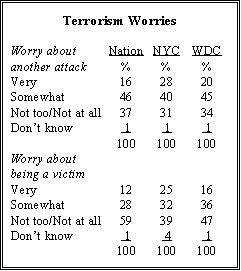
Concern over another terrorist attack has fluctuated over the course of the past year, but at no point has less than a majority been at least somewhat worried.
Currently, 62% of Americans say they are very or somewhat worried about the possibility of a new attack on the United States. That is lower than in June (76%) when the media reported extensively on the capture of “dirty bomb” suspect Jose Padilla.
Worries about another attack are only slightly greater in New York (68%) and Washington (65%). But the gap is wider when it comes to personal concerns over terrorism. Majorities in both New York and Washington fear that they or a member of their family may become a victim of terrorism compared with 40% of the general public.

In the year since the attacks, the public’s assessments of the government’s anti-terrorism efforts have steadily declined. The percentage of Americans who rate the government’s homeland defense program as excellent or good has fallen from a peak of 69% in October to 57% in the current survey. Local anti-terrorism efforts get even lower ratings; overall, just half (47%) give them excellent or good ratings. New Yorkers and Washingtonians give their local governments comparable grades (47%, 54% respectively).
Increasingly, Americans want the government to focus on homeland defense rather than rooting out terrorist networks abroad. Last fall, pluralities gave greater priority to overseas military action. But now just three-in-ten rate military action as most important, while half give greater priority to homeland defense. There is overwhelming support for the proposed cabinet-level Department of Homeland Security, but relatively little awareness of the new agency. Only about half of Americans have heard or read anything about the department.
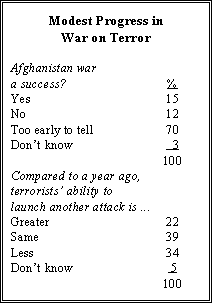
The public has a better opinion of the military effort to combat terrorism than it does of homeland defense. However, fewer Americans believe things are going well militarily than was the case last winter (65% now vs. 89% in January).These declining ratings reflect public uncertainty about the course of the war on terrorism. Only 15% feel the war in Afghanistan has been a success; about as many (12%) say it has been a failure. The overwhelming majority of Americans (70%) think it is too early to tell. And just a third of the public believes terrorists are less able to launch a new attack than they were a year ago. Slightly more (39%) say their capability is the same and one-in-five (22%) believe it is greater than it was a year ago.
As the public has grown more critical of the government, especially regarding homefront defenses, it also has become less willing to give up personal civil liberties in order to prevent terrorism. The number favoring mandatory national identity cards has fallen from 70% shortly after the attacks to 59% in the current survey. Americans are much more opposed to the government monitoring their credit card purchases and personal phone calls, and this opposition also has grown. However, a majority favors permitting airline security personnel to profile people who appear to be of Middle Eastern descent, and two-thirds support the idea of arming airline pilots.
Despite a declining consensus about the war on terror, two profound changes in American public opinion remain apparent. The public continues to be disposed to use military force in the war on terrorism, and Americans favor the United States taking an active role in the world as a way of preventing future terrorist attacks. In terms of specific ways for dealing with terrorism, military options draw broad support but so do alternative strategies.
Nearly six-in-ten (58%) give high priority to taking military action against countries that seek to develop nuclear weapons and about half (53%) say the same about increased defense spending. This feeling carries over to the U.S. military presence abroad as well. By 48%-29%, Americans say that increasing the U.S. military presence overseas would be a more effective way of combating terrorism than decreasing it. Still, a majority of Americans (53%) believe it is very important to reduce U.S. dependence on Middle East oil. These numbers have changed little since the beginning of the year.
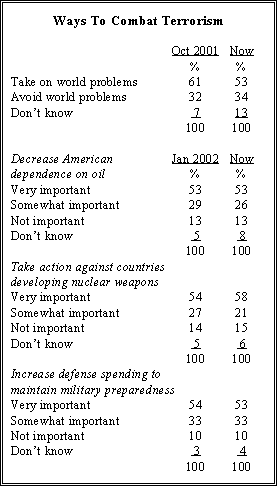
The new poll continues to find a public that is supportive of engagement in world affairs. By 53%-34%, Americans favor the U.S. being very much involved in solving international problems as a way to avert terrorism. This is somewhat less than the 61%-32% majority in favor of active engagement last October. But it still represents a departure for a country that had been wary of dealing with global trouble spots in the post-Cold War era.
There still is, however, a reluctance to use economic aid as a weapon in the war on terror. Only a quarter of the public believes that providing aid to alleviate poverty in the Middle East is a very important means of reducing terrorism. But a 56% majority favors coming to the aid of Afghanistan to help it recover from the war and two-thirds accept the idea that the United States will have to continue to deploy troops there to maintain civil order.
The new poll does find considerably more support for basing U.S. anti-terrorism policy mostly on national interests, rather than strongly taking allied interests into account. By 45%-35%, Americans now say national interests should take precedence; last fall, the margin was two-to-one (59%-30%) in favor of giving allied interests strong consideration. The shift in favor of a U.S.-centered policy was most pronounced among Republicans, who favor that idea by 57%-29%.
Significantly, public sentiment for a go-it-alone strategy does not extend to a possible conflict with Iraq. While most Americans (64%) favor using military force to get rid of Saddam Hussein, support for taking action in the absence of allied support withers to just 30%. Support for military action fell to 42% when tested with the prospect that the U.S. may suffer thousands of casualties.
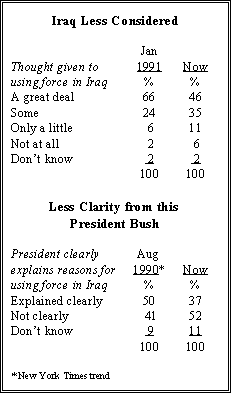
For all the recent focus on a possible war with Iraq, far fewer people have been giving the matter serious consideration compared with the period before the 1991 Persian Gulf War. Just 46% say they have given a great deal of thought to whether the U.S. should go to war in Iraq. In January 1991, a Center survey found that 66% said they had given a great deal of thought to using force to drive Iraq out of Kuwait.
To many Americans, President Bush has yet to clearly lay out the case for a military action against Iraq, particularly when compared with his father a decade ago. As early as August 1990, half of Americans believed that then-President Bush had clearly explained the rationale for sending troops to the Persian Gulf. Today, just 37% say that the president has clearly articulated reasons for using force to end Saddam Hussein’s rule.
The survey shows that, on a range of issues related to the use of force, fears of future terrorism are shaping public policy attitudes. Those who worry most about possible new attacks are decidedly more likely than other people to favor aggressive policies to deal with terrorism, including increased military spending, pre-emptive strikes to wipe out facilities of countries developing nuclear weapons, and using military force to bring about regime change in Iraq.
One consequence of this is that in the post-9/11 era women worry more than men about another attack and this serves to reduce the long-standing gender gap on the use of force and defense spending. Women are about as supportive as men of taking military action against Iraq and suspected nuclear powers, although they are more sensitive to the possibility of casualties.
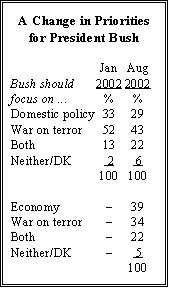
Continuing concern about terrorism notwithstanding, the economy once again is a competing source of public anxiety. As many Americans say they want President Bush to focus on the economy as on terrorism. Terrorism trumps domestic issues in the public’s mind, but by a smaller margin than earlier this year. There is a wide partisan gap on these issues, with many more Republicans than Democrats citing terrorism as the top presidential priority.
The survey also found:
- Americans look at fire fighters, police officers and rescue workers as the heroes of Sept. 11. Asked in an open-ended format whose performance they found to be most inspiring, 37% named fire fighters and other emergency workers while 14% mentioned the president and 10% said former Mayor Rudolph Giuliani. But 22% of New York-area residents named the former New York mayor as most inspirational.
- Shortly after the attacks, two-thirds of Americans considered them more serious than Japan’s attack on Pearl Harbor, but that view has changed. Just 37% now believe the attacks were more serious than Pearl Harbor, while 43% say they were about as serious.
- If another attack occurs, four-in-ten expect terrorists to use chemical or biological weapons. And a 54% majority believes that Islamic terrorists already living in the United States would be most likely to carry out a new attack.
- Demonstrations of patriotism have become commonplace in the aftermath of Sept. 11. Nearly every respondent (96%) said there have been at least some displays of patriotism in their community flags, bumper stickers, etc. Nearly one-in-five (17%) say their community has established a permanent memorial to the victims of the attacks.
- Just 35% of Americans say Sept. 11 was the start of a major conflict between the West and Islam. But another 19% predict it could turn into such a conflict meaning that 54% believe the war on terrorism is already or could eventually become a “clash of civilizations.”
- Roughly three-quarters of parents in the survey say they have talked to their children about the attack. More moms than dads say they have heard their children express fears about terrorism (53% vs. 34%).
1. For attitudes on the media, see “News Media’s Improved Image Proves Short-Lived,” Aug. 4, 2002.
